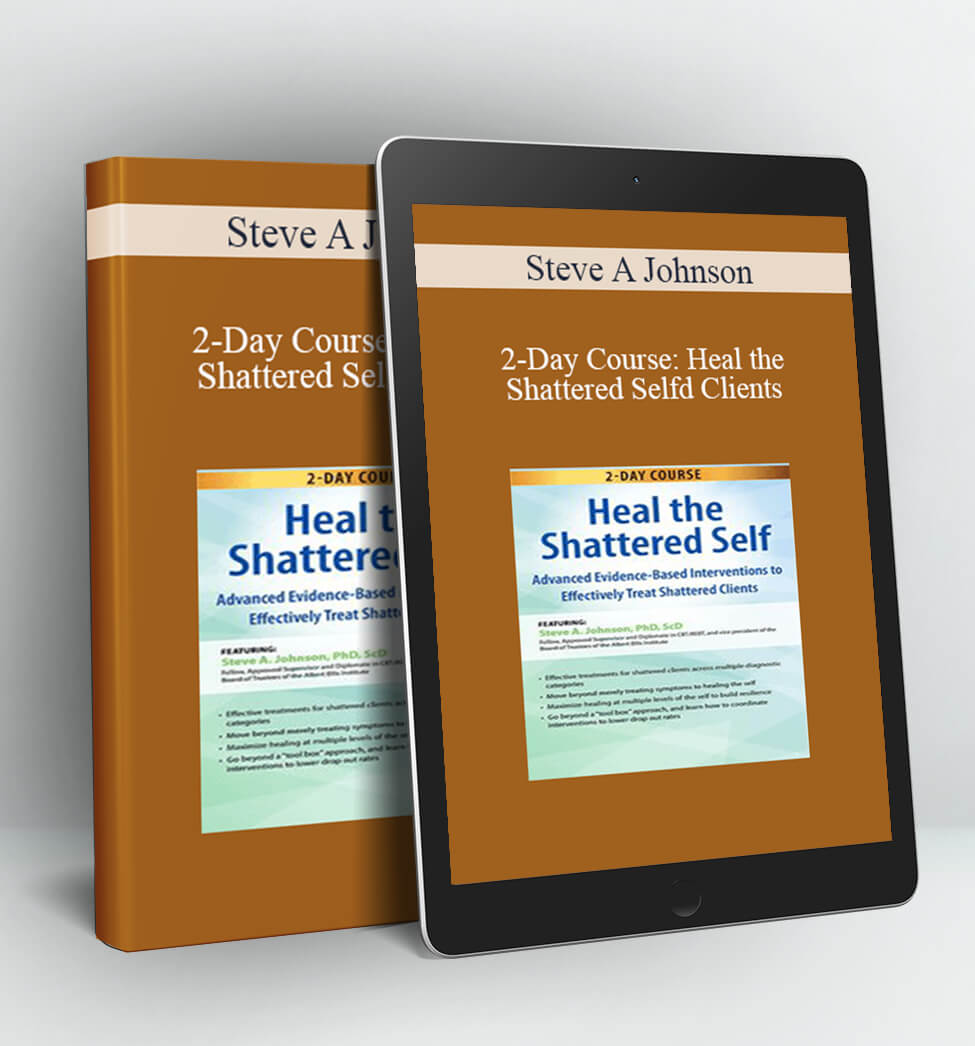
2-Day Certificate Course: Heal the Shattered Self: Advanced Evidence-Based Interventions to Effectively Treat Shattered Clients – Steve A Johnson
Encountering clients with persistent emotional and behavioral symptoms can leave a therapist overwhelmed and not knowing where to start. Imagine if you could effectively treat these clients in ways that move beyond merely addressing symptoms to healing the shattered self using evidence-based interventions from a wide array of current psychotherapy models.
This certificate course recording integrates advanced techniques from multiple evidence-based models and supported by the latest research in neuroscience on the default mode network, all in a way that you can integrate into treatment immediately.
Techniques for healing the shattered self are often scattered among many treatment models, but they are not coordinated in a comprehensive treatment plan to address the client holistically to build resilience and bolster hope.
Watch expert Steve Johnson, Ph.D., ScD, for this certificate recording. His cutting-edge approach will show you how to develop a coordinated, comprehensive treatment plan to treat clients who are experiencing severe and persistent mental, emotional, behavioral, and interpersonal symptoms due to a shattered self.
You will learn how to:
- Go beyond symptom reduction to develop a coordinated, comprehensive treatment plan
- Time and coordinate the interventions to maximize healing at multiple levels of the self to build resilience
- Integrates exposure and present-centered techniques that will ensure excellent outcomes of each are obtained but without the high dropout rate of exposure therapies
- Help clients with a shattered self grieve the loss of self to create a new, more resilient self that reconnects with others, life, and the world in satisfying ways
Advanced skills to effectively treat shattered clients who present:
- Severe repeated trauma
- Complicated grief
- Treatment resistant major depression
- Difficult anxiety disorders
- Debilitating obsessive compulsive disorder
- Major childhood adverse events
- Poly substance abuse disorders and more!
- Implement simple but powerful evidence-based interventions from numerous current psychotherapies to heal a client’s shattered self.
- Employ a technique to help clients employ the imagination to act “as if” one had developed the ideal self.
- Utilize a very simple visual technique to help clients evaluate behaviors in a role rather than evaluate the self.
- Understand which interventions to use for which diagnoses for better client outcomes.
- Formulate how to chain interventions for stronger positive client outcomes.
- Identify the multiple ways to use imagination, story, and metaphor in therapy.
- Coordinate cognitive, emotive, and behavioral techniques to form a comprehensive treatment plan.
- Determine when to use mindfulness and when to use grounding techniques with clients.
- Employ techniques to build client resilience in the face of serious persistent symptoms.
- Identify resources outside therapy to build multiple safety nets for clients.
- Implement a comprehensive plan to heal therapist distress and avoid burnout when treating shattered clients.
- Describe a process for clients and therapists to collaborate in forming a wellness plan.
- Implement quick, simple techniques to help clients unconditionally accept the self, others life, and the world.
- Construct a four-step process to assist clients grieve a shattered self and reconstruct a new, more resilient self.
The Shattered Self: Signs and Symptoms
- Stress and the defense cascade: freeze, flight, fight, fright, flag & faint
- Alterations in emotions, impulses, attention, consciousness, & memory, including autobiographical memory
- Physical symptoms
- Changes in perceptions of self, others, life, and the world
- Disruption of interpersonal relations
- Limitations to the research and potential risks
Assess the Shattered Self
- Neuroimaging, the default mode network, and the three senses of self
- Conduct an autobiographical narrative history
- Trauma-informed, culturally-informed, and gender-informed assessment
- Overcome client resistance during assessment
- Diagnostic instruments
Understand the Shattered Self
- Attachment styles
- Young’s Early Maladaptive Schema
- CBT Cognitive Conceptualization Diagram
- REBT Self-Help Form
- ACT Hexaflex Model
The Shattered Self and DSM-5® Diagnostic Categories
- Trauma disorders and adverse childhood events
- Mood disorders – the hopeless self
- Substance use disorders – numbing the self
- Complicated grief disorder – self without meaning
- Generalized anxiety disorder – the overwhelmed self
The Shattered Mind
- Challenging the five major damaged beliefs & 12 cognitive distortions
- 12 techniques to challenge dysfunctional self-schemas
- 14 techniques to reinterpret events
- Techniques to meet three needs and identify 12 personal strengths
- Behavioral intervention to act “as if” the ideal self has been created
Reach the Shattered Self in Therapy
- Address the interaction of the three senses of self & the default mode network
- Defuse the self from self as conceptualized and self from roles
- Calm the hyper-aroused self
- Resurrect the submerged self
- H.E.A.L. the self
Heal the Grieving Self
- Renarrating the “Hot” memory
- Use imagination to create a new self
- Safely holding the hyper-aroused self
- Four domains of creating safety
- Four steps to reconnect a grieving self
Creatively Heal the Shattered Self
- Creative writing
- Visual arts
- Progressive re-narrating the self
- Listening to the self
Tasks for the Shattered Self
- Task 1: establish safety, stabilize symptoms, and self-care
- Task 2: remember the trauma & transform the memory
- Task 3: create a multi-meaning narrative
- Task 4: reconnect with life
- Task 5: create the ideal self
The Distressed Self of the Therapist
- Identify the signs of caregiver distress
- Eight techniques to reverse caregiver burnout
- Six techniques to inoculate the self against caregiver burnout





